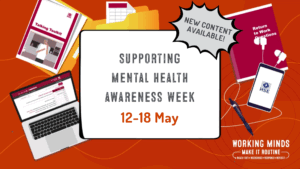World Mental Health Day: Protect your team’s mental health – and your business
To mark World Mental Health Day 2025, the Health and Safety Executive (HSE) is urging employers to go beyond raising awareness and take practical steps to prevent work-related stress.
In 2023/24, approximately half of all self-reported cases of work-related ill health in Great Britain—whether new or ongoing—were linked to stress, depression, or anxiety, according to data from the Labour Force Survey and HSE statistics. On average, each affected worker took 19.6 days off due to these conditions. The impact on businesses is significant – increased absence, reduced productivity, and higher staff turnover.
Take action
Kayleigh Roberts, Work-Related Stress Policy Lead at HSE, said: “This World Mental Health Day, we’re asking employers to keep talking – but start doing. We regularly hear from businesses struggling with rising absence, falling performance, and high staff turnover – often caused by preventable stress at work.
“The good news is that even small changes can make a big difference. Taking steps like reviewing workloads, enhancing communication, or giving staff greater autonomy can lead to improved wellbeing and stronger business performance. The organisations that thrive are those that address the root causes of stress before they escalate into a crisis.”
Support that works
HSE’s Working Minds campaign now includes 36 partners, reinforcing that mental health is a business priority, not just a moral responsibility.
The campaign’s five steps – Reach out, Recognise, Respond, Reflect, and make it Routine – offer employers a clear framework to manage the six key causes of work-related stress: demands, control, support, relationships, role clarity, and change management.
More than 18,000 business leaders have already accessed HSE’s free online learning platform, with 94% saying they now feel confident in applying what they’ve learned.
Make a practical change today
This World Mental Health Day, commit to one change your business can make right now. Start with any of these practical steps:
- review workloads and deadlines
- improve communication and feedback
- use our Talking Toolkit to support conversations
- complete a stress risk assessment using our templates
- encourage managers to complete our free training module
Visit our Work Right website to access tools, templates, and free training.
The time to act is now. Protecting mental health is good for your people – and good for your business.
